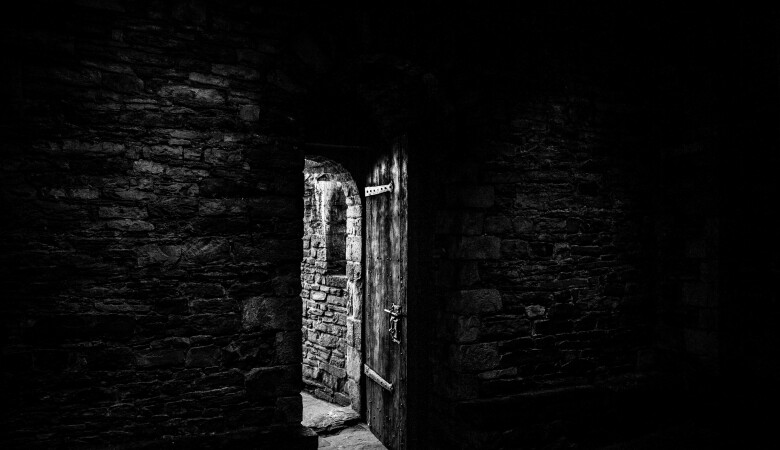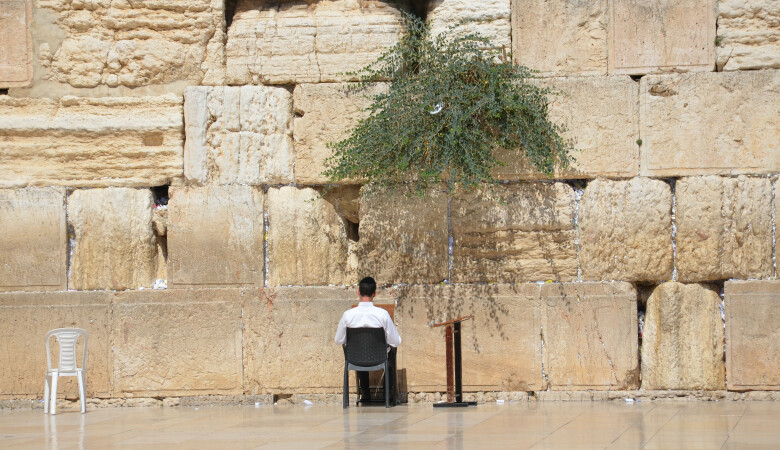Series: Mark
A Foretaste of Christ’s Judgments: Oppressors Punished, Obscure Servants Rewarded (Mark Sermon 69)
November 26, 2023 | Andy Davis
Mark 12:38-44
Abiding in Christ, God Handing Over Men, Judgment
God chose his elect before the foundation of the world to be primarily foolish in the eyes of the world, he did this specifically to shame the powerful and wealthy.
- SERMON TRANSCRIPT -
Turn in your Bibles to Mark 12. We're looking this morning at the text verses 38-44. Most of God's choice of servants throughout history have been obscure people. Their acts of service have been unnoticed by the general population. They've been unrecorded by the historians of their age, seemingly lost for all time in the hiddenness and the forgetfulness of the obscurity of history. But God never forgets. God sees everything that we do, and He never forgets any act of service. The account that we are studying this morning of the tiniest, most seemingly obscure act of giving done by an unnamed and obscure woman was recorded and celebrated by the Holy Spirit in two different places, here in this text and also in Luke 21. It was God's intention that every generation of His people since that time read this account.
This account teaches us many things, but especially it teaches us that God delights in secret acts of piety and humble service that no one ever notices, but that He does. God knows His obscure servants because the overwhelming majority of His people are precisely that, obscure servants. Look at the clear declaration given us by the Apostle Paul in 1 Corinthians 1. He says there, "Brothers, think of what you were when you were called. Not many of you were wise by human standards, not many were influential, not many were of noble birth, but God chose the foolish things of the world to shame the wise. God chose the weak things of the world to shame the strong. God chose the lowly things of the world and the despise things and the things that are not to nullify the things that are so that no one may boast before Him."
"God delights in secret acts of piety and humble service that no one ever notices, but that He does."
This text says that God specifically put His church together in His own mind. We learned from other passages, before the foundation of the world, God chose His church with a majority of people who were not wise by human standards. They're not the geniuses, they're not the intelligentsia, they're not the Nobel Prize winners, they're not the poet laureates, they're not also many influential, they're not the movers and shakers in their generation. They're actually the opposite. They are the moved and the shaken. Not many of them were nobility, not many of the aristocracy, not many of the A-listers, the Hall of Famers, the world champions. God chose His elect before the foundation of the world to be primarily foolish in the eyes of the world, weak in the eyes of the world, lowly. He did this, He says in that text specifically to shame the wise, the powerful, the wealthy, the nobility.
When will that shaming occur? Certainly not for the most part in this world, but it will happen on Judgment Day and for all eternity. That's when it will be obvious that all that mattered is what Christ thought about you, your person, and your works. All that mattered is what Christ thought about you and how He evaluated you. So God loves the obscure, He loves the insignificant, He loves the works that fly perpetually below the radar of our screen that the world never noticed.
I noticed this theme some years ago as I was reading through the Bible and my annual Bible reading program brought me to the book of 1 Chronicles, everybody's favorite book. I don't know if you remember what's in 1 Chronicles. It begins with a series of genealogies of the tribes of Israel, the 12 tribes. There are 911 names in those first nine chapters. Yes, I counted them. Other than David's descendants, the tribe of Judah, over 90% of those names had no cross-reference at all to any other passage in the Bible. In my study Bible, there were no footnotes about those people because we know nothing about them other than what tribe they were and their name or whatever it says in the verse. The question came to my mind, why are they here at all? Why did the Holy Spirit inspire the author of 1 Chronicles to write their names down and then the Lord protected that copy throughout every generation so that all of us would read those names, people that we don't know, and recorded for all eternity. We have no further explanation of their lives, not a word about their deeds, their dreams, their hopes, their expectations, their fears, their achievements, their accomplishments, none of it. So why are they there? I don't know, but it may be to teach us that God cares about obscure people just like you and me, and that though we don't know anything about those people, God knows everything about those people, and that their lives matter to him. Most of God's people in every generation are exactly those kinds of people. They're obscure whose lives will almost be totally forgotten within three generations of their death.
We're coming around to that time of year when some of us watch It's a Wonderful Life. Others can't stand it. You watched it one time and you were like, "Why is this movie on every year?" But I love that movie. The movie is about a simple guy named George Bailey who's an obscure individual, who lives an ordinary life, running the Bailey Building and Loan so that common working class people can have homes to live in. At a key moment, he makes a moving speech to the villain in the story, Mr. Potter, a wealthy man who's taking advantage of these poor people. In that speech, he basically says, "These common people that the Bailey Building and Loan cares for and provides for are the people who do most of the eating and sleeping and living and dying in this town and in this country, and though they don't matter to you, they matter to my father who started the Bailey Building and Loan, they matter to me."
It's a very passionate speech, but Jesus goes infinitely beyond that sentiment. He actually uses the commonest actions of obscure people to build the city in which we will live forever, the radiant new Jerusalem whose stones were put in place by the humble actions of the kind of obscure people that we're looking at today, like this woman who gives the two copper coins. The entire new Jerusalem is built by those types of labors, those types of works. That's what this account is about in my mind, an obscure woman, a widow with no name, almost no resources, who is carefully noticed and celebrated by the only observer who really matters and that's Jesus Christ. He's the judge of all the earth. It is a strong statement that Christ notices and uses hidden acts of sacrifice to build his kingdom of glory.
The context is one of stark contrast. Putting these two paragraphs together, you may say, "What do they have to do with each other?" You've got the Scribes and Pharisees, religious leaders of the day who Jesus just rips in this account with their outward displays of religion that dominated Jewish society, but were actually deeply corrupt. They were wolves in sheep's clothing, plundering poor widows like this one. Then you've got this widow who Jesus, it seems, celebrates. I put it together in terms of the concept of a foretaste of Judgment Day of what Jesus thought about this one category and what Jesus thought about the other.
I. Jesus Gives a Foretaste of Judgment Day
That's the unifying theme of the two paragraphs, Jesus gives us a foretaste of Judgment Day. We begin as we look at that by saying things are not what they appear. There should be a growing sense in the heart of maturing Christians. The things on earth are not as they appear to be. Many of the most powerful people on earth, the wealthiest people on earth are to be the most pitied because of their spiritual condition and the road that they're on. Many, on the other hand, are the meek and lowliest people on earth, Jesus says, who stand to inherit everything, the meek who will inherit the earth.
The Judgment Day that is coming is a day of great reversals, a day in which the lowliest and most obscure of Christ's servants will be exalted to the heavens and crowned with stunning glory, and a day in which those most glorified in this world, the most outwardly powerful and wealthy and dominant will be stripped forever. There is a day coming in which all secrets will be unveiled and all works judged with a perfect eye by the judge of all the earth. That day is called Judgment Day. The Scripture reveals who that judge will be and that judge is Jesus Christ. My task as a pastor and a regular preacher of the Word is to make that Judgment Day vivid in your minds every day, that you think about that day, you get ready because that Judgment Day is most certainly coming.
Jesus is presented in Scripture as the judge of all the earth. Many passages speak of him as a perfect judge. Isaiah 11, for example, speaks of this, “A shoot will come up from the stump of Jesse. From his roots, a branch will bear fruit that shoots from the stump of Jesse — Jesus Christ, the incarnate Lord. The Spirit of the Lord will rest on him. The spirit of wisdom and of understanding, the spirit of counsel and of might, the spirit of knowledge and of the fear of the Lord. He will delight in the fear of the Lord. He will not judge by what He sees with his eyes or decide by what He hears with his ears, but with righteousness, He will judge the needy. With justice, He will give decisions for the poor of the earth. He will strike the earth with the rod of his mouth. With the breath of his lips, He will slay the wicked. Righteousness will be his belt, and faithfulness his sash around his waist. That is Jesus portrayed as the judge of all the earth in Isaiah 11.
Jesus openly made this claim for himself. In John 5, He said that the Father has given Him the honor of being the judge of every human being that ever has lived or ever will live because He's the Son of Man. John 5:22, 23, "The father judges no one but has entrusted all judgment to the son that all may honor the son even as they honor the Father." It's an incredible statement to make saying that the entire human race will honor Jesus the way they honor God when He sits up to judge the human race. A few verses later, John 5:26, 27, "For as the Father has life in Himself, so He has granted the son also to have life in himself and He has given him authority to judge because he is the son of man." Then in verse 30 of that same chapter, "By myself, I can do nothing. I judge only as I hear, and my judgment is just I seek not to please myself but Him who sent me."
That's an open claim that Jesus makes of having an honor equal to God himself and that God has given Him the role of being judge of all the earth. He says the same thing in Matthew 25, speaking of the Second Coming, "When the son of man comes in his glory and all the angels with him, he will sit on his throne in heavenly glory." He'll sit in honor and glory and power judging. That's the picture. "All the nations will be gathered before him and he'll separate the people one from another as a shepherd separates the sheep from the goats." Jesus, the judge of all the earth. On that day, He will, it says in Proverbs 20:8, winnow out the wicked with his eyes and He will reward his faithful servants with eternal honors. Proverbs 20:8 says, "When a king sits on his throne to judge, he winnows out all evil with his eyes." He's going to separate out the wicked, the goats, and He'll reward his faithful servant as He says in Matthew 10:42, “If anyone gives even a cup of cold water to one of these little ones, these messengers, because he is my disciple, he will never lose his reward.” That's a tiny act of service similar to the widow giving her two copper coins. You’ll never lose your reward because Jesus will see every cup of cold water given to help missionaries, to help servants of the word along. He will reward them, and they'll get the same reward as the messengers, the missionaries, the pastors, et cetera, the support system. It's an incredible statement.
II. Jesus Exposes the Spiritual Predators
Jesus begins in this passage by exposing the spiritual predators. This is the final week of Jesus' life. We're walking through that. Jesus is in the temple and He's teaching. He's been ministering, healings, it says in one of the other Gospels, not here in Mark, but He heals, and He does his teaching ministry. These are the final words in Mark's Gospel that He speaks to his unbelieving enemies. The Scribes and Pharisees have dogged his steps every day of his public ministry. They hate Him, they're opposed to Him, they're genuinely wicked people. But to others, they appear as righteous. The Scribes and Pharisees are the spiritual leaders of Israel. Jesus says in Matthew 23, they have a legitimate authority, they sit in Moses' seat, so you must obey them. They have a legitimate authority, but they have misused that authority. They've abused that authority, and Jesus calls them out. This is their final chance to be convicted by the only perfect prophet that's ever lived, to take his fiery words, his convicting words to heart and repent of their sins and find salvation in Him. Like a surgeon cutting open the body to find the tumor, He exposes their wickedness.
Mark's account here is greatly truncated compared to Matthew’s account. It's greatly reduced. Look at verses 38-40, "As he taught, Jesus said, 'Watch out for the teachers of the law. They like to walk around in flowing robes and be greeted with respect in the marketplaces and have the most important seats in the synagogues and the places of honor at banquets. They devour widows houses, and for a show make lengthy prayers. These men will be punished most severely.’” That's it. Just a few sentences here. But in Matthew 23, He gives the seven woes to the Scribes and Pharisees in this rhythmic pattern, "Woe to you, scribes and Pharisees, you hypocrites. Woe to you, scribes and pharisees, you hypocrites,. . .” a whole chapter. It's a lengthy chapter in Matthew 23.
Here he just says Scribes or teaches of the law. Matthew adds Pharisees, he puts them together. Jesus warns the people to watch out for them. Earlier He had called them the blind leading the blind. Now, here He exposes their love for ostentatious displays of religiosity, flowing robes, the trappings of godliness and of piety, but there's no real spiritual power behind it, there's no life behind it, no genuine holiness. They love the horizontal honors they get from the Jewish population, they love to be greeted in the marketplaces, they love the places of honor, they love to be in the most important seats in the synagogues. They love this kind of thing. They were used to it, they expected it, they probably felt they deserved it, and it seems that the people felt so too because they gave it to them. They gave them this honor. But Jesus also exposes their hypocrisy for a show. He says here in Mark's Gospel, they make lengthy prayers. They're just putting their piety on display.
But then Jesus also probes to their secret wickedness, they devour widows’ houses. They take advantage of widows who had no protection. Because of their positions of power in the society, they could go over a widow's estate and give her binding spiritual, religious, legal advice. Furthermore, they could and did demand exorbitant fees from widows for their services. If the widow couldn't pay, they had the right to confiscate their homes. It's really horrible and disgusting, especially when you consider what James says in James 1:27, "Religion that our God and Father accepts as pure and faultless is this: to look after orphans and widows in their distress." They were taking advantage of widows in their distress. It says in Exodus 22:22-24, "Do not take advantage of the widow or the fatherless. If you do and they cry out to me, I will certainly hear their cry. My anger will be aroused and I will kill you with the sword."
Jesus's harsh words to them in Matthew 23 and his brief words here is a foretaste of the coming sword, and that sword is going to come on Judgment Day for them. He's representing a rage from God against them for this, the fact that they devour widows’ houses. He's using his words as a foretaste of the sword. Remember how in Revelation He's depicted as having a double-edged sword coming out of his mouth. He has this rage and He's clearly revealing what's going to happen to these wicked religious leaders on Judgment. Look at verse 40, they will receive the greater condemnation. I believe this principle is based on one's knowledge of the Word of God. The more you know and didn't obey, the worse it's going to go for you on Judgment Day. That's why I've said before, the worst place to go to hell from is a healthy Christian family that poured the gospel into you from childhood and you never repented. I do believe the more you know and don't live up to it by faith, the worst it will be for you in Judgment Day. How about these Scribes who were pouring over every letter of the law of Moses and they weren't living it out? It's a terrifying thing. In Greek it says they'll have greater condemnation or abundant judgment, actually overwhelming judgment.
"The worst place to go to hell from is a healthy Christian family that poured the gospel into you from childhood and you never repented. I do believe the more you know and don't live up to it by faith, the worst it will be for you in Judgment Day."
The woeful statements, as I said, are in Matthew 23. The rhythm is seven times, a sevenfold condemnation that He uses with his words, a prophetic statement of woe, "Woe to you scribes and Pharisees, you hypocrites." He probes their hypocrisies, their outward show of inward corruption. He calls them whitewash tombs which look beautiful on the outside but inside full of dead men's bones and everything unclean. It is a terrifying chapter to read and it culminates in this statement of judgment on them, Matthew 23:33, "You snakes, you brood of vipers, how will you escape being condemned to hell?" It's a terrifying statement coming from the judge of all the earth.
Then He makes the prediction of Jerusalem's destruction because they always persecute the prophets sent to them. "Therefore," Matthew 23, "I'm sending you prophets and righteous men and teachers. Some of them you'll kill and crucify, others you'll flog in your synagogues and pursue from town to town. And so upon you will come all the righteous blood that has been shed on earth from the blood of righteous Abel to the blood of Zechariah, son of Berechiah whom you murdered between the temple and the altar. Truly I say to you, all this will come down on this generation." Then He says this, "Jerusalem, Jerusalem, you who kill the prophets and stone those sent to you, how often I have longed to gather your children together as a hen gathers her chicks under her wings, but you were unwilling. Behold your house is left to you desolate for I tell you, you will not see me again until you say, 'Blessed is he who comes in the name of the Lord.'"
That sets up the next chapter that we're going to go to, God willing, Mark 13, the prediction of the destruction of the temple and of Jerusalem, but it all comes on the tail end of his condemnation of these terrible religious leaders, the Scribes and Pharisees.
III. Jesus Extols an Obscure Giver
That's the condemnation He gives to those corrupt religionists. Now we turn to the widow, the obscure giver, and Jesus extols her. Look at verse 41-44, "Jesus sat down opposite the place where the offerings were put and watched the crowd putting their money into the temple Treasury. Many rich people threw in large amounts, but a poor widow came and put in two very small copper coins worth only a few cents. Calling his disciples to him, Jesus said, 'Truly I tell you, this poor widow has put more into the treasury than all the others. They all gave out of their wealth, but she, out of her poverty, put in everything, all she had to live on.'"
It begins with Jesus's physical position. It's very significant, Jesus sitting down and watching. I want you to get a foretaste of Jesus on his Judgment seat. That's what you get the picture of. He's sitting down and He sees everything. As in Revelation 1, He has eyes of blazing fire. He's watching what's happening in the midst of all this hustle and bustles, just a busy day, people coming and going, and they're pouring money into this treasury, into this box, and He's observing it. This is a picture you should have in your mind. Jesus is seated on his Judgment throne and watching everything I do. He's evaluating me. That's what Judgment Day is all about. We're all going to come before his Judgment seat and give an account for everything we've ever done in our lives. This account gives us a picture. We can picture it in our minds. He's seated and watching and observing, and He's talking about it.
All of this is going on, and the monies are coming, people are making contributions in the temple grounds. He's sitting there just watching it. Sadly, the monies that are being collected in this big box, they go to the Scribes and Pharisees, the very ones that Jesus has condemned. They're going right to those wicked people, and it's tragic. You can picture a wooden chest with a hole and a metal-like trumpet-looking thing, like a funnel. The people would come in and they would pour their money in. It was all coins, it wasn't paper money. It would be precious metals, gold, silver, copper. The larger the donation, the more money, the more sound it would make. It would just rattle and clang down the thing if you're putting in lots of amounts.
Some of these people were coming in and making a big show of what they were offering. I think they have these kind of money things like at the Harris Teeter store too. Sometimes people bring huge amounts of coins and it's like... I can't imitate it, but it's just this loud noise and they're all coming and they're giving. Lots of heavy coins. The gold is the heaviest, the densest and lots of that. It's just coming down. I think it lines up somewhat with Jesus' condemnation of this kind of outward showy giving. In Matthew 6:2, He says, "When you give to the needy, do not announce it with trumpets as the hypocrites do in the synagogues and on the streets to be honored by others. Truly I tell you, they have received their award in full." I don't know if there's actual trumpets, but this thing was like that. It was making a lot of noise if you gave a big amount.
While all this is going on, all this racket and bustle, along comes this woman and she's got in her hand these two little copper coins. The text identifies her as a poor widow. She was at the lowest level of their society socioeconomically. There was no one to protect her. She had no resources. Again, she's completely obscure. The text tells us nothing about her. Her gift would've made almost no difference at all in the running of the temple or anything. It was just a tiny, seemingly insignificant amount. Jesus watches her carefully. I think He could only have had supernatural knowledge of what she put in. Imagine how small these coins were. She extends her hand, opens it, and walks away. How do we know it was two copper coins? It's just that supernatural knowledge the Bible gives us, but Jesus knew. He watches her carefully and He has supernatural knowledge of her condition like He does of that Samaritan woman who's had five husbands and the man she now has is not her husband.
Jesus has supernatural knowledge of her circumstances and He speaks of the significance of her giving. He knows that those two coins represented everything she had in the world, all she had to live on. He speaks of that significance of the action. One could easily question her judgment in giving this amount, think that she was actually behaving foolishly. There's actually a well-known commentator that took this whole angle. He said, "These two accounts are put together where you have the victimizer and then the victim." I think it makes a certain amount of sense. However, he goes too far when he says that the text in no way presents the woman as a model of giving. That I cannot agree with. If you just read the paragraph, you'd think that Jesus is actually commending her faith-filled giving. He's talking about sacrifice, He's talking about the gift is proportional to what it meant to you. It's proportional to your sacrifice. It's not a value system on an absolute scale. It has to do with what that money meant to you. So I think that commentator went too far when he says, "Look, there is nothing commendable about what she..." Actually, he goes so far as to say, "She's somewhat foolish, but she's an example of a widow who's being plundered and being taken advantage of." That part I can agree with. But that she's not a role model, I can't go that far.
As a matter of fact, I don't know if you remember that story in the Old Testament about Elijah, during the famine, during the drought, he was being fed by some ravens, and he was by the brook, but then that dried up, and then it was time for him to move. God tells Elijah, 1 King 17: 9 and following, "Go at once to Zarephath in the region of Sidon and stay there. I have directed a widow there to supply you with food." The thing that's funny about that is she knew nothing about that, but God says, "I've directed her." In other words, it's a done deal. She's going to take care of him. He went to Zarephath, and when he went to the town gate, the widow was there and she's gathering sticks. He called to her and asked, "Would you bring me a little water in a jar so I might have a drink?" As she was going to get it, he called, "And bring me, please, a piece of bread." You get the feeling in the account, "Now you've gone too far. I'll get you a little water, that's hard enough to come by during a drought. But the bread now, that's a whole different matter.” So she says, "As surely as the Lord your God lives, I don't have any bread. What I have is a handful of flour in a jar and I have a little olive oil in a jug. I'm gathering a few sticks to take home and make a meal for myself and my son that we may eat it and die." She's basically saying, this is her version of the two copper coins, this is all I have to live on, this is it. But then Elijah said to her, "Don't be afraid. Go home and do as you said, but first, make a small loaf of bread from me from what you have and bring it to me. And then make something for yourself and your son for this is what the Lord the God of Israel says, the jar of flour will not be used up and the jug of oil will not run dry until the day the Lord sends rain on the land."
He gives her a promise from the Lord. The key thing with this woman in the Elijah story is she believed that promise. She was willing to act in faith on that promise. She went away and did as Elijah had told her. There was food every day for Elijah and for the woman and her family for the jar of flour was not used up and the jug of oil did not run dry in keeping with the Word of the Lord spoken by Elijah.
I do not think we can say this widow is an example of foolishness having given too much. Think again, the rich young ruler, Jesus commanded him to sell everything he had and give it to the poor. I don't think that she's negative. As a matter of fact, I want to turn around and say she is an example of sacrificial giving that will stand across all the ages and is worth celebrating.
IV. God Delights in Obscure Servants and Hidden Works
God delights in obscure servants and hidden works of sacrificial giving. He delights in them and Jesus notices them. As I've said, most of God's servants are obscure people who do their good deeds in a hidden way. God sees what they will do and will reward it based on His principles. Jesus said, "When you give to the needy, do not let your left hand know what your right hand is doing that your giving may be in secret, then your Father who sees what is done in secret will reward you. And when you pray, go into your room, close the door, and pray to your Father who is unseen, and your Father who sees what is done in secret will reward you. And when you fast, put oil in your head and wash your face so it'll not be obvious to others that you're fasting but only to your Father in heaven and your father who sees what is done in secret will reward you." Those are three examples, giving to the poor, prayer, and fasting where God observes secret acts of hidden piety and rewards them on Judgment Day.
Culminating all that, He talks about storing up treasure in heaven. In Matthew 6, He says, "Do not store up for yourselves treasures on earth where moth and rust destroy and thieves break in and steal, but store up for yourselves treasures in heaven where moth and rust do not destroy and where thieves do not break in and steal for where your treasure is, there your heart will be also." That whole section, Matthew 6:1-21, commends a life of secret piety and giving in which your works are not being done to be observed by others, but God sees and He rewards them and He's exhorting you store up a whole lifetime of those works, that's going to be treasure for you in heaven.
Later, as I mentioned, when teaching about rewards in Matthew 10, He sends out the disciples two by two and makes this amazing statement, which I alluded to a moment ago, "Whoever welcomes a prophet because he is a prophet, will receive a prophet's reward. Whoever welcomes a righteous man because he is a righteous man will receive a righteous man's reward. And if anyone gives one of you messengers of the gospel, even a cup of cold water, he'll certainly not lose his reward." What is Jesus saying there? He's saying that the hidden support system people get the same rewards as the upfront famous people. The ones that supported Luther or Calvin or John Owen or whatever, the ones that no one even knows about that enabled them to live and to do their works and all that, they will be honored and rewarded with the same kind of reward that the upfront famous leaders get.
That means on Judgment Day, there'll be some surprises. A lot of them as a matter of fact, because Jesus says about this widow, she gave more than anyone else gave. You see, she gave more. She gave the most. It's not something we would've seen. One of the Judgment Day principles is the gift is accepted based on what it meant to you, not based on its absolute market value. He says in 2 Corinthians 8:12, "If the willingness is there, the gift is acceptable according to what one has, not according to what one does not have." That means the harder it is for you to give, and I don't just mean financially, it could be in evangelism, it could be your time, your energy, it could be hospitality, it could be anything, if it's hard for you to do and you do it anyway, it's more commendable than if it comes out of a surplus. I think most of the giving we give is out of surplus. It doesn't pinch us. It's not a real sacrifice. But for this widow, it is a real sacrifice.
That means Judgment Day is a great reversal. Some of the greatest servants of Christ will be Judgment Day surprises like this widow, and many, if not most of them, will be women. I've studied church history. History tends to focus on men, on great leaders, political leaders, religious leaders, military, financial, and they've generally been men. There are great men who have made great sacrifices and they will be worth getting some reward in heaven. They are what they appear to be, godly men who served. But there are also millions of hidden women whose faithful work for the kingdom was never been seen. Single women who served in obscurity, mothers who raised generations of Christians, who poured into them the Gospel from infancy. We don't know what they did, but God knows. This account, this woman, this widow with the two copper coins is like the prime witness in my whole account here that there's going to be great reversals and surprises on Judgment Day and that God honors the secret works of obscure servants including women.
In the book that I wrote on heaven, The Glory Now Revealed, I focused on this woman and two copper coins. By the way, that's why I couldn't go with that commentator and his observance saying that she was no good example. I was already in print, so I couldn't back out of it. So I'm going to stick with it, but I really do, I think if you read this paragraph, I think you get commendation by Jesus, not criticism. She's the prime witness in that chapter on obscure heroes and obscure movements in history that'll be revealed on Judgment Day.
But it wasn't just her or just women, there were a lot of people. My favorite obscure missionary hero that I learned about as I was working on that book was a man named James Gilmour. He was a missionary to Mongolia in the 1870s. I've carefully studied the history of missions, and I'd never heard of this guy. He labored in the most severe climate imaginable, with temperatures dropping to as low as 40 degrees below zero. He survived on handfuls of millet, trekked over 300 miles a week, over 40 miles a day to reach people in the remotest places on planet earth. He struggled with extreme loneliness. He struggled with a constant sense of total failure to his mission.
Why do I say that? The Mongolians that he was reaching were not hostile to him. They were generally hospitable, they were amicable, but they just weren't interested in the Gospel. They believed in their Buddhism and their spirituality. They were fine with how they were. Though they tolerated him ministering and they didn't overtly persecute him, they had no interest in what he was saying. He recorded over 24,000 gospel presentations and only three conversions. I have never read in all the church history of anyone that was so faithful with so little return on his investment. Think about that, I mean, it's probably why you haven't heard of him. If he had saved 10% of the people, It's like, "Great missionary leader." He was a great missionary leader, but just not in the ordinary way. He was faithful. What would it be like for you? Imagine your personality. Imagine you in that place and you have shared with 3,000 people and none of them have come to Christ. You're going to share with another 3,000, still no one. What kind of perseverance does it take to keep going when you get so little return? Of those 24,000, for all we know, a larger percentage of them will actually be in heaven. You know how it says, "I planted the seed, Apollos watered, but God made it grow." Sometimes seeds are planted and you never know what happened to it. But James Gilmour is that kind of an individual. He reminds me of the heroes in Hebrews 11. They went about in sheepskins, in goatskins, destitute, persecuted, mistreated, the world was not worthy of them. They wandered in deserts and mountains and in caves, in holes, in the ground. That was James Gilmour.
As I finish, I was thinking recently about a movie I watched, a powerful movie called A Hidden Life. It was about a farmer who lived a simple life with his wife and daughters in the Austrian Alps during World War II. His name was Franz Jägerstätter, and he would've been completely obscure had he not been one of the rare men who stood up to Adolf Hitler. He was a conscientious objector who was willing to serve in the army, but not to take the vow of personal obedience to Hitler that every soldier had to take. He would not do it, and because of that, he was severely punished and even martyred by the Nazis. The movie's called A Hidden Life, and it comes from a quote by a female author named George Eliot who wrote a book called Middlemarch, and this is the quote, "... for the growing good of the world is partly dependent on unhistoric acts; and that things are not so ill with you and me as they might've been, is half owing to the number who lived faithfully a hidden life and rest in unvisited tombs." That's most of us.
Within three generations if the Lord doesn't return, people will not visit your tomb. They will not know much about you. All of your works will be forgotten by everyone alive on planet Earth, but Jesus will never forget. The call for me at this end of Mark 12 is to live a life of faithful obedience to the commands of God, to trust in Christ as our Lord and Savior because without that, you can't store up any good works, only wrath, but to trust in Him and then to live a quiet and a hidden life that God will reward on Judgment Day.
Close with me in prayer. Father, we thank you for this incredible account of this woman. We thank you Lord Jesus that you were there to see it and to comment on it and to celebrate it. And Lord, I pray that we would be faithful, that we'd be willing to live a hidden life that's not hidden to you, a life that is obscure to the hustle and bustle of the world age, but not obscure to you, a life that you'll reward on Judgment Day faithfully, not missing anything that we do by faith in service to you. In Jesus' name. Amen.































